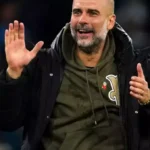Pep Guardiola rejected opportunity as he pushed back firmly against the idea that his career after Manchester City could lead him into the boardroom at FC Barcelona, insisting he has no interest in trading the touchline for the presidential suite at the club where he made his name.
The Manchester City manager is entering a period of heightened scrutiny, with ongoing questions about how much longer he intends to remain in the Premier League and what direction his life in football might take once his coaching journey ends.
With speculation intensifying around whether the 2026/27 season may be his final chapter at the Etihad Stadium, Guardiola chose this week to publicly address growing assumptions about his long-term plans.
The wider conversation has been fuelled not only by external reports but also by internal reflections at Manchester City.
Senior figures across the club’s hierarchy, including recently appointed sporting director Hugo Viana, are understood to be assessing various succession scenarios.
Even if Guardiola offers no final timeline, the club’s leadership is already contemplating potential candidates capable of carrying forward the footballing identity he has built over nearly a decade.
Recent reporting has suggested Guardiola is weighing the idea of either a sabbatical or a complete withdrawal from coaching once his City tenure comes to an end.
After close to ten years shaping English football at an elite level, the possibility of another reinvention has lingered in discussion.
But despite the mounting theories, Guardiola rejected opportunity to work at Barcelona, he does not foresee a dramatic shift into executive power or symbolic leadership roles.
His comments arrive at a time when Barcelona have been linked with dreams of reconnecting with several former players and iconic figures.
Yet Guardiola, perhaps the most celebrated coach of Barça’s modern era, is adamant that such a reunion will not come in the form of taking charge in the boardroom.
Asked in an interview with Catalan outlet RAC1 whether he could imagine himself assuming the presidency at Barcelona, Guardiola gave a direct and unambiguous response.
“I don’t reject Barça. You’re always a supporter of where you started,” he said, reflecting on his deep historical ties to the club. But he quickly drew a firm boundary, adding, “But me with a tie in the presidential box? No, I can’t see myself doing that.”
This intervention offers the clearest signal yet of how Guardiola views the next phase of his life.
Far from pursuing the influence of high office, he appears intent on stepping away from the mechanisms of power that operate above the pitch.
For a figure whose career has been shaped by his immersion in the day-to-day work of coaching, the prospect of swapping tactical sessions and player relationships for political manoeuvring has little pull.
Indeed, the City manager has previously expressed discomfort with the administrative and political dimensions of football.
He has long maintained that his passion lies at the training ground, in the rhythms of match preparation and the demands of elite performance. His stance this week remains consistent with that long-held philosophy.
During the same interview, Guardiola also took a moment to reflect on his 1000 games as a manager – a milestone accompanied by a catalogue of triumphs and defining moments.
- Forgotten Man City talent ready for dramatic January transfer to Premier League rival
- Guardiola targets ‘extraordinary’ Premier League superstar to replace Jack Grealish
Asked to revisit some of the matches that have shaped his career, he returned to a night that remains etched into Manchester City’s recent history.
“With Manchester City, the [Champions League] semi-final with [Real] Madrid at home – the peak moment of this decade [at the club],” he said, highlighting the emotional intensity and significance of that victory.
It served as a reminder of the scale of success that has characterised his era in Manchester, both domestically and in Europe.
He went on to emphasise the magnitude of City’s achievements under his guidance.
“You remember the good moments that have been most decisive, matches played to life or death. What is true is we’ve won many. I feel sorry for rivals, but we’ve done very well. Out of 1000, we’ve won more than 700.”




